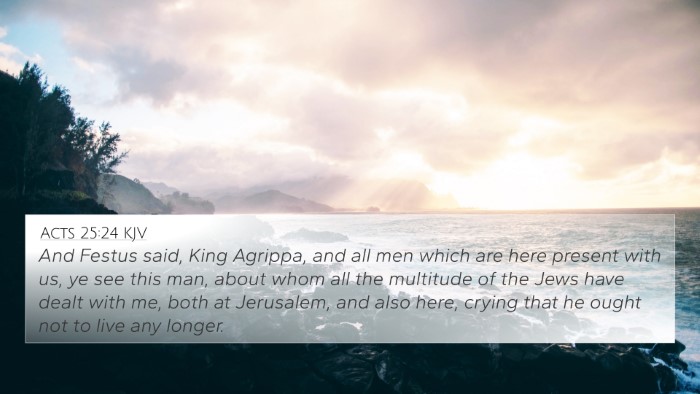Understanding Acts 22:22
Acts 22:22 states, "And they gave him audience unto this word, and then lifted up their voices, and said, Away with such a fellow from the earth: for it is not fit that he should live."
This verse captures a pivotal moment in Paul’s defense of his faith, as he speaks to a hostile audience in Jerusalem. The reaction of the crowd reveals their intense emotions and cultural context concerning the message of the Gospel.
Summary of Insights
The insights from public domain commentaries reveal several layers of meaning within Acts 22:22:
- Matthew Henry:
Henry emphasizes the dramatic response of the crowd. He notes that Paul’s words stirred up significant anger, illustrating how truth can provoke hostility, particularly when it contradicts deeply held beliefs.
- Albert Barnes:
Barnes offers insight into the cultural and religious tensions at play, explaining that the mention of the Gentiles incited fury among the Jewish audience, who believed they held exclusive rights to God’s favor.
- Adam Clarke:
Clarke highlights the importance of Paul’s ministry to the Gentiles. He points out that this was not merely an insult but a serious indictment, illustrating the broader rejection of the Christian message by many of his contemporaries.
Thematic Connections
Acts 22:22 serves as a crucial point in understanding the themes of rejection, the universality of the Gospel, and the challenges faced by early Christians. Below are key themes and connections related to this verse:
- Rejection of the Messenger: Paul's experience mirrors other instances in the Bible where prophets faced severe opposition (e.g., Jeremiah 11:21).
- Message to the Gentiles: This idea connects with the Great Commission (Matthew 28:19), highlighting the spread of the gospel beyond Jewish boundaries.
- Persecution for Faith: The fervor of the crowd foreshadows the persecution of Christians, as seen in Matthew 10:22.
Cross-References
Acts 22:22 demonstrates numerous links with other Bible verses, which emphasize similar themes of rejection and the message to the Gentiles:
- Luke 4:29-30: The rejection of Jesus by His own people.
- John 15:18-19: The world hating Jesus and His followers.
- 2 Corinthians 4:3-4: The veiling of the truth to those who do not believe.
- Acts 17:5-6: The hostility faced by Paul in Thessalonica.
- Galatians 1:10: Seeking approval from God rather than men.
- 1 Peter 4:4: Being ridiculed for the Christian way of life.
- Romans 1:16: The gospel is for everyone, not just the Jews.
These references not only connect themes but also provide a deeper understanding of the context within which Paul spoke.
Importance of Cross-Referencing
Using tools for Bible cross-referencing enhances understanding. It unearths thematic links and enriches one’s study. The following are some methods and resources:
- Bible Concordance: Useful for locating specific words and their occurrences throughout the Bible.
- Bible Cross-Reference Guide: Helps identify related verses for deeper analysis.
- Comprehensive Bible Cross-Reference Materials: Books that categorize verses under themes or topics.
Application for Study
Engaging with Acts 22:22 through comparative Bible verse analysis encourages a broad exploration of scripture, allowing us to witness the consistent themes of resistance, redemption, and renewal throughout biblical text. A detailed cross-reference between Gospels can reveal how each evangelist approached the same core truths differently, thus enriching our understanding of these events.
How to Cross-Reference Bible Verses
To effectively find cross-references:
- Look for similar themes or keywords.
- Use a Bible study app or tool dedicated to cross-referencing.
- Consult commentaries that highlight interconnections.
Conclusion
Acts 22:22 encapsulates the tension between faith and cultural identity. By cross-referencing this verse with others, a broader theological understanding emerges, pointing to the timeless struggle of believers and the universality of Christ's message.







